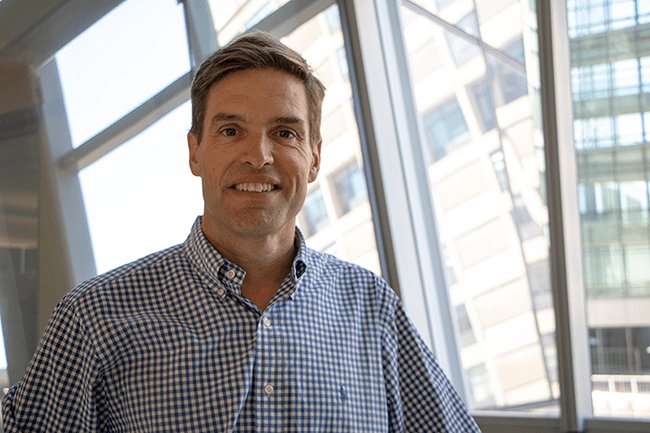News All News
March 26th, 2019
Harvard researchers’ immune-silent stem cell technology licensed to Sana Biotechnology
Developed through Harvard’s Blavatnik Biomedical Accelerator, innovations could lead to novel cell therapies to treat disease
By Caroline Perry

“These inventions give us the tools to create treatments and cures for a host of conditions that have few, if any, effective treatments today," said Chad Cowan, whose Harvard lab's innovations have been licensed to Sana. (Photo credit: Mary Todd Bergman, Harvard Stem Cell Institute.)
Cambridge, Mass. – March 26, 2019 – Protecting transplanted cells from immune attack is a serious challenge. As with any organ transplant, cell lines derived from stem cells are sometimes rejected. Innovations by Harvard University researchers are now enabling a new company to develop a solution that may work in cell therapies for any patient with any disease.
Harvard’s Office of Technology Development (OTD) has executed a license agreement with Sana Biotechnology, a recently launched company co-founded by Harvard faculty that is focused on creating and delivering engineered cells as medicines for patients. Harvard’s foundational technology consists of methods for producing hypoimmunogenic stem cells that can be differentiated into any cell type and then transplanted into a patient without triggering immune rejection.
Sana was launched in January 2019 with operations in Seattle, WA; Cambridge, MA; and South San Francisco, CA. The company’s founding venture capital firms include ARCH Venture Partners, Flagship Pioneering, and F-Prime Capital.
“We are excited to have placed this important technology with Sana, a startup which has assembled a world-class team to advance the development of allogeneic (off-the-shelf) cell therapies,” said Vivian Berlin, Managing Director, Strategic Partnerships, in Harvard OTD. “The company’s leadership, vision, and focus on scaled solutions give us confidence that this groundbreaking technology can be developed and deployed to the fullest extent possible for patients.”
The hypoimmunogenic stem cells are derived from human pluripotent stem cells that have been genetically engineered to appear benign to, effectively hiding from, the immune system. To achieve this outcome, the inventors modified the cells’ genomes to reduce the activity of genes that produce proteins that can provoke the transplant recipient’s immune system, and to increase the activity of genes that produce tolerogenic factors that signal “friend” not “foe.”
Sana intends to create hypoimmunogenic pluripotent stem cells and use them as the starting material to develop novel cell therapies. Under appropriate conditions, these engineered stem cells can be differentiated, at significant scale, into various types of cells a patient needs to replace missing or damaged cells in the body. It has been shown in the field that stem cells can be turned into, for example, cardiomyocytes (heart muscle), endothelial cells (blood vessels), hepatocytes (liver cells), or pancreatic beta cells (cells that produce insulin).
“Overcoming the immune-rejection barrier is essential for making stem cell–derived therapies broadly accessible,” said Chad Cowan, PhD, whose laboratory in Harvard’s Department of Stem Cell and Regenerative Biology (SCRB) developed the licensed innovations. “These inventions give us the tools to create treatments and cures for a host of conditions that have few, if any, effective treatments today.”
In addition to the Cowan Lab’s platform technology, which is exclusively licensed to Sana within the field of therapeutics, the license agreement grants Sana non-exclusive access to Harvard technology for performing high-efficiency, ex vivo genome editing.
Cowan is a co-founder of Sana and the company’s Chief Scientific Officer. Richard Mulligan, the Mallinckrodt Professor of Genetics, Emeritus, at Harvard Medical School, is also a co-founder.
“Harvard’s research enterprise is a uniquely powerful engine for biomedical discovery and startup formation,” said Isaac T. Kohlberg, Harvard’s Chief Technology Development Officer and Senior Associate Provost. “Through focused business development efforts, we’re fortunate to have connected with a team of entrepreneurs and investors who share our researchers’ vision to transform the state of medical care beyond conventional pharmaceuticals. By licensing this cell therapy platform to Sana, we’re leveraging the expertise and resources of a dedicated business team to ensure Harvard’s innovations bring the greatest benefit to patients in need.”
The Cowan Lab’s research was supported in part by the National Institutes of Health (DK097768) and was developed further through funding from Harvard’s Blavatnik Biomedical Accelerator and the Harvard Stem Cell Institute.
“The Harvard research team, with the Blavatnik Biomedical Accelerator, has developed and validated this technology to an advanced stage, and we are thrilled to have the opportunity to push it forward,” said Steve Harr, MD, President and CEO of Sana. “Sana is focused on engineering cells as medicines for patients, both reprogramming cells in the body to fix function and making cells outside the body that physicians can utilize to replace missing or damaged cells in the body. Harvard’s technology is an important piece in making our vision a reality.”
Cowan, formerly a faculty member in Harvard SCRB, is currently Assistant Professor of Medicine at Harvard-affiliated Beth Israel Deaconess Medical Center. Prof. Cowan is also a faculty member of Harvard Stem Cell Institute.
Tags: Accelerator, Blavatnik, Startups, stem cells
Press Contact: Kirsten Mabry | (617) 495-4157
